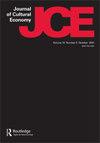Intimate valuation devices: Doing valuation while doing dating in Tinder texts
IF 1.9
3区 社会学
Q1 CULTURAL STUDIES
引用次数: 0
Abstract
ABSTRACTDating apps are valuation devices that people use to set up and valuate digital identities. Building a profile is a first move in a valuation game that contributes to intimate valorization of persons and elicits valuations by other members of a dating platform. This article contributes to the analysis of valuation in intimate life by analyzing profile texts as documents of dating practice. Using data from 1004 profiles collected in Berlin, Germany, it shows that profile texts formally resemble personal ads and identifies three rules of doing digital dating: Users identify the dating self by describing who they are, what they do and what they like; they valorize the self by references to valuation criteria that indicate what counts as valuable or worthy; and they do so by using the list as a medium.KEYWORDS: Valuationvaluation gamesonline datingdating appsdocumentary method Disclosure statementNo potential conflict of interest was reported by the author(s).Notes1 Vatin (Citation2013, 31) suggested to distinguish two dimensions of ‘valuation’ as ‘valorizing’ – the ‘production of value’ – and ‘evaluating’ – the ‘assessment of value’ – , a distinction that was taken up by Michèle Lamont (Citation2012) in her influential article on the sociology of ‘valuation and evaluation’ (see also Krüger Citation2022). While I agree with critics of this distinction like Callon (Citation2013, 267f.) and Heinich (Citation2020, 77) that measurement always implies the attribution of value – Heinich (Citation2017, 26ff) identifies measurement as one form of attributing worth among others –, it is helpful in this particular case for distinguishing two aspects of the dating process: setting up a profile with the focus on attributing value to an identity and assessing the value signals implemented in the profile.2 As an exception to this common practice of abstaining from the presentation of quantified values, OkCupid presents users with a number signifying the percentage of compatibility with the other user – and notably not a global estimate of a profile’s intimate value.3 Contrary to this literature, I hold that the concept of ‘game’ is helpful for analyzing social life in more general terms: discussions about ‘gamification’ refer to one historical version of how dating games are played.4 On compensated dating and the boundary work that distinguishes it from sex work, see Nayar (Citation2017).5 For an example of different cultures of dating in an ‘analogue’ setting, see Krause and Kowalski (Citation2013) on dating in Berlin and New York.Additional informationNotes on contributorsThorsten PeetzThorsten Peetz is Privatdozent of sociology at the University of Bremen and currently Interim Professor of Sociological Theory at the University of Bamberg. He studies processes of valuation in intimate and religious games as well as processes of digitalization.亲密评估工具:在Tinder文本约会时进行评估
摘要约会软件是人们用来建立和评估数字身份的评估工具。建立个人资料是估值游戏的第一步,它有助于个人的亲密估值,并引发约会平台上其他成员的估值。本文通过分析作为约会实践文件的个人资料文本,有助于分析亲密生活中的价值。利用从德国柏林收集的1004份个人资料的数据,该研究表明,个人资料文本在形式上类似于个人广告,并确定了进行数字约会的三个规则:用户通过描述他们是谁、他们做什么、他们喜欢什么来确定约会自我;他们通过参考价值标准来评价自我,这些标准表明什么是有价值的或有价值的;他们通过使用列表作为媒介来做到这一点。关键词:估价估价游戏在线约会约会应用文件法披露声明作者未报告潜在的利益冲突。注1 Vatin (Citation2013, 31)建议将“估值”的两个维度区分为“价值增值”——“价值的生产”——和“评估”——“价值的评估”——mich勒·拉蒙特(Citation2012)在她关于“估值和评估”社会学的有影响力的文章中采用了这种区分(另见kr ger Citation2022)。虽然我同意像Callon (Citation2013, 267f.)和Heinich (Citation2020, 77)这样对这种区别的批评,即测量总是意味着价值的归属——Heinich (Citation2017, 26ff)将测量确定为其他价值的一种形式——在这种特殊情况下,区分约会过程的两个方面是有帮助的:建立一个专注于将价值归因于身份的配置文件,并评估配置文件中实现的价值信号作为一个例外,OkCupid向用户提供了一个数字,表示与另一个用户的兼容性百分比——值得注意的是,它不是对个人资料亲密度的总体估计与这些文献相反,我认为“游戏”的概念有助于从更一般的角度分析社交生活:关于“游戏化”的讨论指的是约会游戏的历史版本关于有偿约会和区分其与性工作的边界工作,见Nayar (Citation2017)关于在“模拟”环境中约会的不同文化的例子,请参见Krause和Kowalski (Citation2013)关于柏林和纽约约会的研究。作者简介:托尔斯滕·皮茨托尔斯滕·皮茨是不来梅大学社会学副教授,现任班贝格大学社会学理论临时教授。他研究亲密和宗教游戏中的价值评估过程以及数字化过程。
本文章由计算机程序翻译,如有差异,请以英文原文为准。
求助全文
约1分钟内获得全文
求助全文

 求助内容:
求助内容: 应助结果提醒方式:
应助结果提醒方式:


